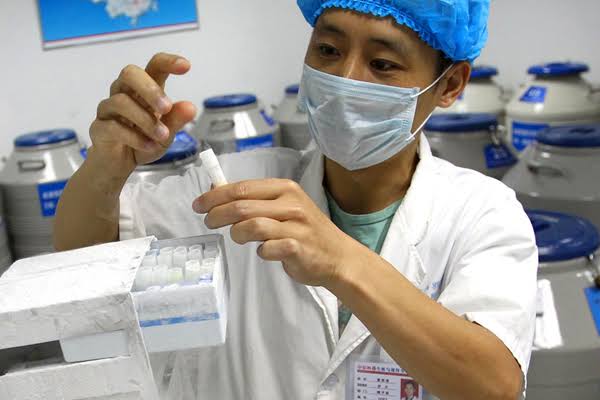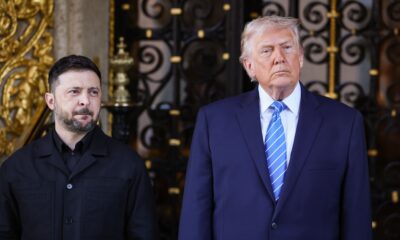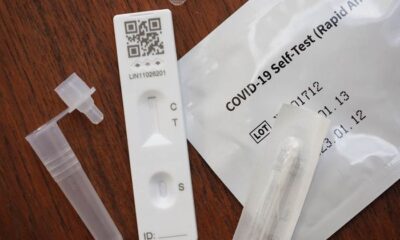Business
Egg Donors Cautioned Against Donating Solely for Financial Compensation

The UK fertility regulator has announced an increase in the compensation for egg donors, urging individuals not to donate solely for financial gain. Starting October 1, the compensation will rise from £750 to £986, marking the first increase in over a decade to account for inflation and rising costs.
While it is illegal to pay individuals for their eggs in the UK, the compensation is intended to cover expenses incurred during the donation process. The Human Fertilisation and Embryology Authority (HFEA) emphasized that egg donation should be viewed as an altruistic act rather than a financial opportunity. Clare Ettinghausen, director of strategy and corporate affairs at the HFEA, stated, “It’s going up to just under £1,000, which the HFEA felt was a right balance between compensating people for their time but really recognizing that, in the UK, egg donation is an altruistic act.”
The UK faces a shortage of egg donors, particularly from black and ethnic minority backgrounds. Yasmin Sharman, an egg donor from London, was inspired to donate at the age of 18 due to the lack of donors of color. “I realized there was a lack of people of color donors, and that upset me… and so that made me want to do it again,” they explained.
There are concerns that raising compensation could lead individuals to donate purely for monetary reasons, potentially exploiting lower-income individuals. “If you raise it too much, there is a risk there that people will do it solely for the money, which puts lower-income people more at risk,” Sharman noted.
The HFEA also highlighted that egg donation is not without risks, as donors undergo the initial stages of IVF treatment, which can be uncomfortable. Additionally, donors are informed that children born from their eggs have the right to contact them once they turn 18.
It’s important to note that egg donor compensation is not paid in Scotland, differentiating it from the rest of the UK. The HFEA aims to maintain a balance between providing fair compensation and preserving the altruistic nature of egg donation.
Business
US Inflation Slows as Used Car and Energy Prices Decline

Inflation in the United States eased in January, helped by falling costs for energy and used vehicles, offering encouraging signs for economic stability.
New data from the Labor Department showed the Consumer Price Index rose by 2.4% over the 12 months to January — down from 2.7% the previous month and marking the slowest pace of price growth since May.
The moderation in inflation is likely to strengthen arguments from President Donald Trump and others that the Federal Reserve may be able to reduce interest rates without reigniting price pressures.
While the latest figures point to steady progress toward the Fed’s 2% inflation target, analysts caution that the path ahead may not be entirely smooth. Some warn that inflation could stabilise or even edge higher if businesses begin passing on tariff-related costs to consumers, or if labour shortages push up service prices.
For now, however, there are few indications that tariffs are having a broad impact. Core commodity prices — excluding food and energy — remained largely unchanged during the month, suggesting underlying price pressures are contained.
Neil Birrell, chief investment officer at Premier Miton Investors, noted that while the longer-term effects of tariffs remain uncertain, January’s data may contain statistical quirks that influenced the outcome.
Even so, he said the report is likely to “ease the path towards a cut in rates sooner rather than later”.
“The US economy looks to be in fine fettle with growth strong, inflation stable, the job market looking firmer and a Fed that has room to manoeuvre,” he added.
Business
China bans hidden car door handles over safety concerns

China has announced a nationwide ban on hidden car door handles, becoming the first country to formally prohibit the design amid growing global scrutiny of electric vehicle (EV) safety and a renewed focus on passenger protection.
The new regulations, issued by the Ministry of Industry and Information Technology, will require all cars sold in China to be fitted with mechanical door releases on both the inside and outside. The rules are set to take effect on 1 January 2027, giving manufacturers time to adapt while signalling a clear shift towards more practical and safety-focused vehicle design.
Hidden door handles, which sit flush with the car body and often rely on electric power to deploy, were popularised by Tesla and have since become widespread across China’s rapidly expanding new energy vehicle (NEV) market. NEVs include fully electric cars, plug-in hybrids and hydrogen fuel-cell vehicles. According to figures cited by state-run China Daily, around 60% of the top 100 best-selling NEVs in China currently use hidden handles.
The decision follows a series of high-profile safety concerns, including two fatal crashes in China involving Xiaomi electric vehicles, where suspected power failures may have prevented occupants or rescuers from opening the doors. While investigations into those incidents are ongoing, regulators have moved proactively to reduce similar risks in the future.
Under the new standards, every passenger door except the boot must include a recessed space of at least 6cm by 2cm by 2.5cm on the exterior, ensuring that door handles are always accessible. Inside the vehicle, manufacturers will be required to clearly mark door-opening mechanisms with visible signs measuring at least 1cm by 0.7cm, making emergency exits easier to identify in stressful situations.
Cars that have already received regulatory approval and are close to entering the Chinese market will be granted an additional two-year grace period to update their designs, a move intended to balance safety improvements with industry stability and innovation.
Although the rules apply only to vehicles sold in China, the country’s central role in the global automotive industry means the impact is likely to be felt well beyond its borders. China is the world’s largest EV market and a major exporter of electric cars, components and technology, making its regulatory decisions highly influential.
International regulators are already paying close attention. Tesla’s door handle design is currently under investigation by US safety authorities, and European regulators are also considering whether similar measures are needed. In November, the US National Highway Traffic Safety Administration (NHTSA) opened an investigation into Tesla’s electric-powered door handles after receiving reports that they stopped working without warning. The probe focused on 2021 Model Y vehicles, with nine complaints recorded, including four cases where owners said they had to break windows to free occupants.
Chinese officials have framed the new rules as part of a broader effort to ensure that rapid innovation in the EV sector does not come at the expense of basic safety. By mandating simple, mechanical solutions alongside advanced technology, regulators say they are reinforcing consumer confidence and supporting the long-term, sustainable growth of the industry.
Business
Trump Says Venezuela Will Hand Over Up to 50 Million Barrels of Oil to US After Political Transition

US President Donald Trump has announced that Venezuela will “turn over” between 30 million and 50 million barrels of oil to the United States, following a military operation that removed President Nicolás Maduro from power and ushered in an interim administration in Caracas.
In a statement posted on his Truth Social platform on Tuesday, Trump said the oil — valued at about $2.8bn (£2.1bn) at current market prices — would be sold at full market value, with the proceeds placed under US control. He added that the funds would be used to benefit both the Venezuelan people and the United States.
“I am pleased to announce that the Interim Authorities in Venezuela will be turning over between 30 and 50 MILLION barrels of high-quality, sanctioned oil to the United States of America,” Trump wrote. “This oil will be sold at its market price, and that money will be controlled by me, as President of the United States of America, to ensure it is used to benefit the people of Venezuela and the United States.”
The announcement came a day after Delcy Rodríguez, formerly Venezuela’s vice-president, was sworn in as interim president. Maduro has been transferred to the United States, where he is facing long-standing drug-trafficking and weapons-related charges.
Trump also said the move marked the beginning of a broader economic reset for Venezuela, predicting that the US oil industry would be fully operational in the country within the next 18 months. He added that he expected major international investments to flow into Venezuela as stability returns and sanctions are restructured under the new political arrangement.
“This is the start of something very big,” Trump said earlier this week, arguing that Venezuela’s vast energy resources could once again be developed at scale with international backing and modern infrastructure.
The proposed oil transfer has drawn strong reactions internationally. China, which has been Venezuela’s largest oil customer in recent years, criticised the announcement and objected to reports that the United States is seeking exclusive access to Venezuelan crude. Beijing said it opposed any arrangement that sidelines existing commercial partners.
Despite the criticism, US officials have framed the development as a pathway to economic recovery for Venezuela after years of sanctions, declining production and political isolation. Supporters of the plan say the controlled sale of oil could provide immediate financial relief while laying the groundwork for longer-term reforms.
Venezuela holds the world’s largest proven oil reserves, but output has been severely constrained in recent years due to underinvestment, infrastructure decay and international sanctions. Trump’s administration argues that renewed engagement with US energy firms and access to global markets could help restore production and stabilise the country’s economy.
Global oil markets reacted cautiously to the announcement, with prices easing slightly amid expectations of additional supply, though analysts noted that the volumes discussed remain modest relative to total global consumption.
-

 News1 week ago
News1 week agoIranian Nobel Laureate Faces New Sentence as Support and Global Scrutiny Intensify
-

 News1 week ago
News1 week agoRussia Identifies Suspects in Shooting of Senior General
-

 News6 days ago
News6 days agoStarmer Vows to Stand Firm as He Rallies MPs Amid Mounting Political Pressure
-

 News5 days ago
News5 days agoNine killed and 25 injured in shootings at school and home in Canada
-

 News1 week ago
News1 week agoThai PM claims election victory as Conservatives Take Commanding Lead
-

 Entertainment6 days ago
Entertainment6 days agoBad Bunny Breaks New Ground at Super Bowl with Spanish-Language Spectacle Celebrating Unity
-

 Entertainment1 week ago
Entertainment1 week agoGraham Norton and Lewis Capaldi Join Taylor Swift for Playful, Star-Studded ‘Opalite’ Video
-

 News1 week ago
News1 week agoZelensky Says US Aims for June Deadline to End Ukraine War


















